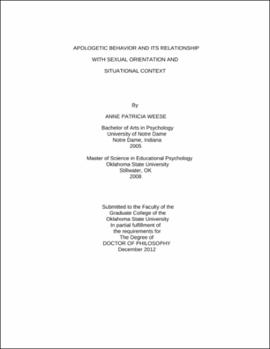| dc.contributor.advisor | Dorton-Clark, Julie | |
| dc.contributor.author | Weese, Anne Patricia | |
| dc.date.accessioned | 2013-11-26T08:31:24Z | |
| dc.date.available | 2013-11-26T08:31:24Z | |
| dc.date.issued | 2012-12 | |
| dc.identifier.uri | https://hdl.handle.net/11244/7149 | |
| dc.description.abstract | The purpose of this study was to investigate the relationship between sexual orientation and situational context with regard to the prevalence of apologetic behaviors. The sample of current division I female student athletes completed a demographic form and the Apologetic Behavior Questionnaire. The questionnaire consisted of open-ended questions which generated qualitative data and a Likert-scale survey which generated quantitative data. Qualitative data were analyzed using open, axial, categorical coding and quantitative data were analyzed using a mixed-design ANOVA with subsequent post-hoc analyses. Qualitative analyses resulted in theme codes for each open-ended question. The codes identified for negative stereotypes included Sexuality (common theme), Masculinity/Femininity (common theme), Body (somewhat common), Personality, and Comparisons to Men. Themes for the positive stereotypes included Body (common theme), Personality (common theme), Skills, Intelligence, and Comparisons to Men. Participants were asked to discuss the ways in which their coaches and teammates communicate their views of homosexuality in sports. The most common response was that coaches and teammates do not discuss the issue. Other responses indicated that coaches and teammates are either accepting or not accepting. Some of the responses contained contradictory views; that coaches and teammates communicate both negative and positive views of homosexuality in sports. No significant relationship was found between sexual orientation and situational context. However, heterosexual participants indicated that they engage in more apologetic behaviors in all situations than did their non-heterosexual counterparts. Significant main effects were found between the three situations. Overall, participants reported that they engage in apologetic behaviors more often when in public than when around coaches or teammates. Athletes also did not significantly differ in the amount of apologetic behavior they engage in depending on sport type. | |
| dc.format | application/pdf | |
| dc.language | en_US | |
| dc.rights | Copyright is held by the author who has granted the Oklahoma State University Library the non-exclusive right to share this material in its institutional repository. Contact Digital Library Services at lib-dls@okstate.edu or 405-744-9161 for the permission policy on the use, reproduction or distribution of this material. | |
| dc.title | Apologetic behavior and its relationship with sexual orientation and situational context | |
| dc.contributor.committeeMember | Koch, Julie | |
| dc.contributor.committeeMember | Carlozzi, Barbara | |
| dc.contributor.committeeMember | Boswell, Don | |
| dc.contributor.committeeMember | Thomas, David | |
| osu.filename | Weese_okstate_0664D_12435.pdf | |
| osu.accesstype | Open Access | |
| dc.type.genre | Dissertation | |
| dc.type.material | Text | |
| dc.subject.keywords | apologetic behavior | |
| dc.subject.keywords | athletes | |
| dc.subject.keywords | homophobia in sport | |
| dc.subject.keywords | sexual orientation | |
| dc.subject.keywords | apologetic behavior | |
| dc.subject.keywords | athletes | |
| dc.subject.keywords | homophobia in sport | |
| dc.subject.keywords | sexual orientation | |
| thesis.degree.discipline | Educational Psychology | |
| thesis.degree.grantor | Oklahoma State University | |
